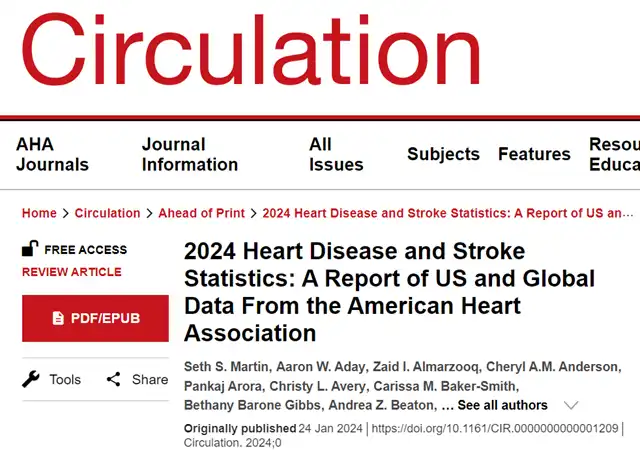AHA Releases 2024 Global Heart and Brain Health Report: Highlighting 10 Key Factors
- Normal Liver Cells Found to Promote Cancer Metastasis to the Liver
- Nearly 80% Complete Remission: Breakthrough in ADC Anti-Tumor Treatment
- Vaccination Against Common Diseases May Prevent Dementia!
- New Alzheimer’s Disease (AD) Diagnosis and Staging Criteria
- Breakthrough in Alzheimer’s Disease: New Nasal Spray Halts Cognitive Decline by Targeting Toxic Protein
- Can the Tap Water at the Paris Olympics be Drunk Directly?
AHA Releases 2024 Global Heart and Brain Health Report: Highlighting 10 Key Factors
- Should China be held legally responsible for the US’s $18 trillion COVID losses?
- CT Radiation Exposure Linked to Blood Cancer in Children and Adolescents
- FDA has mandated a top-level black box warning for all marketed CAR-T therapies
- Can people with high blood pressure eat peanuts?
- What is the difference between dopamine and dobutamine?
- How long can the patient live after heart stent surgery?
AHA Releases 2024 Global Heart and Brain Health Report: Highlighting 10 Key Factors
Every year, the American Heart Association (AHA) and the National Institutes of Health (NIH) release the latest statistical data on heart disease, stroke, and cardiovascular risk factors, including health behaviors (smoking, physical activity, nutrition, sleep, and obesity) and health factors (cholesterol, blood pressure, blood sugar control, and metabolic syndrome) that contribute to cardiovascular health.

Recently, the AHA unveiled the 2024 Global Heart Disease and Stroke Data Report, summarizing the latest data related to heart disease, stroke, and cardiovascular risk factors in the Life’s Simple 8 (LS8) for cardiovascular health management reference. Here’s a breakdown of some of the key findings:
In addition to reporting statistics on metabolic syndrome, kidney disease, congenital heart defects and Kawasaki disease, arrhythmias, subclinical atherosclerosis, coronary heart disease, acute coronary syndrome and angina, and cardiac arrest, the report also highlights the following factors:
4 Categories of Health-Influencing Behaviors
-
Diet and Nutrition
- In 2021, globally, 7.34 million deaths were attributed to dietary risks, representing a 54.5% increase since 1990.
- Major risk factors for diet-attributed deaths include high sodium intake, low whole grain intake, and low legume intake.
-
Physical Activity and Sedentary Behavior
- Lack of physical activity is a significant risk factor for cardiovascular diseases such as coronary heart disease and stroke.
- Recommendations from the 2018 U.S. Physical Activity Guidelines suggest at least 150 minutes of moderate-intensity aerobic exercise per week or 75 minutes of vigorous-intensity aerobic exercise, along with resistance training at least twice a week.
-
Overweight/Obesity
- Obesity, assessed by Body Mass Index (BMI), has seen a significant global increase.
- Treatment options for obesity include dietary interventions, surgical procedures, and medications such as metformin and others.
-
Smoking
- Smoking remains a preventable cause of death globally.
- The World Health Organization (WHO) Framework Convention on Tobacco Control outlines strategies to reduce tobacco harm, including policies for detection, prevention, cessation support, warning labels, advertising bans, and taxation.
4 Major Risk Factors Influencing Health
-
High Cholesterol and Other Lipid Abnormalities
- Cholesterol plays a crucial role in atherosclerosis and cardiovascular diseases.
- Comprehensive lipid profiles, including LDL-C, HDL-C, and triglycerides, are recommended for assessing cardiovascular risk.
-
Hypertension
- High blood pressure is a major risk factor for coronary heart disease, heart failure, and stroke.
- Different definitions exist for diagnosing hypertension, including blood pressure measurements and antihypertensive medication use.
-
Diabetes
- Type 2 diabetes prevalence has significantly increased globally.
- Treatment strategies for diabetes include lifestyle management, metformin, SGLT-2 inhibitors, GLP-1 receptor agonists, and aspirin therapy for those at high cardiovascular risk.
-
Sleep
- Adequate sleep duration and quality are essential for cardiovascular health.
- Disorders like obstructive sleep apnea are associated with increased cardiovascular risk.
Partial Cardiovascular Diseases Influencing Health
- Stroke: Globally, there were 93.81 million stroke cases in 2021, with ischemic strokes being the most common.
- Brain Health: Optimal brain health involves various cognitive functions, with stroke and cerebrovascular diseases being significant risk factors for cognitive decline and dementia.
The report also covers data on metabolic syndrome, kidney disease, congenital heart defects, arrhythmias, subclinical atherosclerosis, coronary heart disease, acute coronary syndrome, angina, and cardiac arrest. For more details on the AHA 2024 Global Heart Disease and Stroke Data Report, refer to the official sources.
AHA Releases 2024 Global Heart and Brain Health Report: Highlighting 10 Key Factors
References:
[1] Martin SS, Aday AW, Almarzooq ZI, et al. 2024 Heart Disease and Stroke Statistics: A Report of US and Global Data From the American Heart Association. Circulation. 2024 Jan 24. doi: 10.1161/CIR.0000000000001209. Epub ahead of print. PMID: 38264914.
(source:internetjEmoOwRXAeIlMcueCKAQmw, reference only)
Disclaimer of medicaltrend.org
Important Note: The information provided is for informational purposes only and should not be considered as medical advice.



